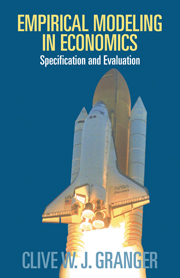Foreword by G.C. Harcourt
Published online by Cambridge University Press: 22 September 2009
Summary
It is a privilege and a pleasure to write a foreword to the published version of Clive Granger's 1998 Marshall Lectures which I much enjoyed listening to. Granger has made fundamental contributions to modern econometrics, both to its conceptual underpinnings and to its techniques. In the lectures he brought to bear wisdom accumulated during 40 years of teaching and research to discuss the conceptual difficulties associated with empirical work in economics. He has always argued that the bridge between economic theory and applied economics should be a sturdy structure, across which it was both necessary and safe for practitioners to go in both directions. He is also one of those, unhappily all too rare, highly imaginative and creative persons who are never afraid to ask (seemingly) simple questions, nor to give simple answers. He is undogmatic and open-minded, with as firm a grasp on fundamental economic principles as on approaches to and techniques in econometrics, not a few of which are his inventions. To cap it all, he is splendid company, as much at home in a coffee room or nattering with students as at a formal dinner with the great and the good.
In the first chapter Granger discusses the practical optimum way of analyzing the economic and social impact of deforestation in the Brazilian portion of the Amazon rain forest.
- Type
- Chapter
- Information
- Empirical Modeling in EconomicsSpecification and Evaluation, pp. vii - xPublisher: Cambridge University PressPrint publication year: 1999



